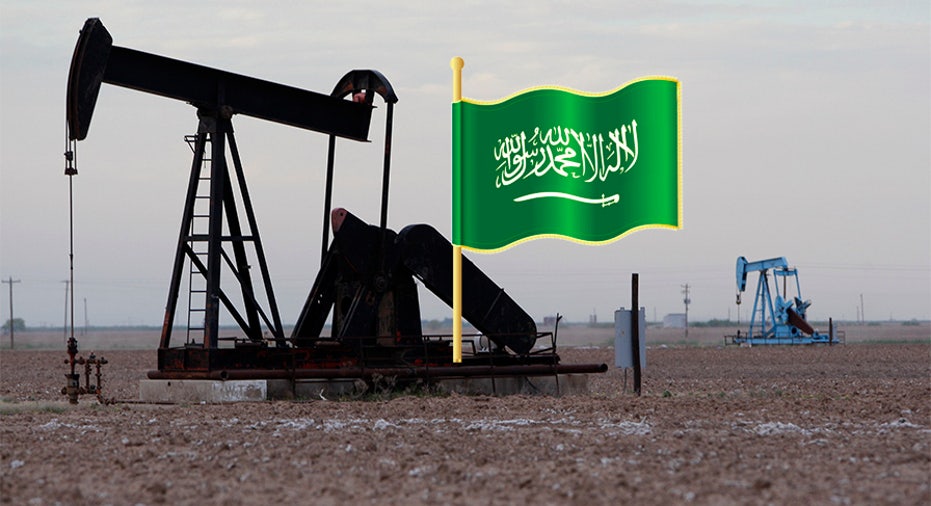Saudi Arabia searches for U.S. shale-oil deal

Saudi Arabia is hunting for an energy deal in American shale country.
Saudi Arabian Oil Co., known as Aramco, has had initial conversations about either taking a stake in Tellurian Inc., a Houston-based liquefied-natural-gas developer, or agreeing to buy some of its fuel in the future, people familiar with the matter said. Separately, it has also inquired about acquiring assets in two giant U.S. oil and gas basins, the Permian and Eagle Ford, the people said.
The talks haven’t reached an advanced stage, and the Saudis have talked to other, undisclosed U.S. companies about natural gas export deals, the people said. A spokesperson for Tellurian said: “We cannot comment on commercial dealings.”
Aramco didn’t respond to requests for comment.
Any effort to acquire American oil-and-gas production assets would mark a watershed moment for Saudi Arabia. It has been the world’s top exporter of crude oil for decades, but booming U.S. production has shaken the kingdom, depressing prices and compelling the government to rethink its dependence on revenue from its massive petroleum reserves.
The talks come as Saudi-U.S. relations have improved as President Donald Trump touts Saudi Arabia as a key ally in containing Iran. U.S. Energy Secretary Rick Perry said he spoke with Saudi Crown Prince Mohammed bin Salman about U.S. LNG exports during a recent visit to the kingdom.
The U.S. is now the largest producer of of and gas combined and starting to export its energy abundance. Aramco owns refineries around the world, including the U.S., but doesn’t produce any oil and gas outside Saudi Arabia’s borders. The kingdom doesn’t import any natural gas or crude oil.
Producing and exporting American gas would diversify Aramco, which could be attractive to investors ahead of the company’s planned initial public offering in 2018 -- expected to be the world’s most valuable listing. Saudi officials have said Aramco would make international investments in producing assets after the IPO.
Saudi energy minister Khalid al-Falih told reporters earlier this month that Aramco was more interested in importing natural gas from areas closer to the kingdom like the Mediterranean Sea and East Africa. Russian President Vladimir Putin also has pressed Saudi officials to invest in Russian gas.
But the people familiar with the matter said Saudi officials have held wide-ranging talks with oil-and-gas producers in the U.S. shale patch this year.
By investing in shale production, Saudi Arabia could gain a better understanding of the U.S. oil-and-gas industry, which has upended the traditional model of energy production. Shale companies don’t invest in long-term projects that produce for decades like Saudi Arabia does, but rather pump in quick spurts that can be ratcheted down when prices fall or ramped up when they rise.
Other Middle Eastern petrostates are trying to learn more about shale. Earlier this year Abu Dhabi’s sovereign fund Mubadala made a small investment with private equity in U.S. shale.
“The objective is to understand the dynamics of this business, the technical side and the financial side – in particular the cost,” said Musabbeh Al Kaabi, chief executive of Mubadala’s petroleum and petrochemicals business.
The Saudis also have been engaged in a global search for natural gas partners as the kingdom’s energy officials push to make the fuel a larger part of their mix for producing electricity, some of which is currently generated by burning crude oil.
Tellurian is known for its plans to export American liquefied natural gas via a terminal in Louisiana, expected to be finished by 2022. LNG is a super-chilled fuel that can be shipped around the world like crude oil.
Tellurian was co-founded by former BG Group executive Martin Houston and Charif Souki, former chief executive of Cheniere Energy Inc., the first U.S. company to build a sizable LNG export project. The company also has natural gas production and undeveloped shale acreage.
Saudi Arabia’s gas reserves are hard to extract and high in sulfur content which increases processing costs. So even though it has almost as much gas as the U.S. under the ground -- about 4.5% of the world’s reserves, according to BP (NYSE:BP) -- it isn’t a major gas producer.
Importing LNG so far hasn’t made economic sense for Saudi Arabia. The kingdom subsidizes electricity costs for consumers, so the costs of infrastructure and shipping LNG add to its price and make it less attractive than just burning its large reserves of oil.
The calculation has begun to change as the kingdom prepares the Aramco IPO. In the long term, the increased revenue from additional oil exports could outweigh the initial costs involved in adding LNG to its energy mix.
“It’s very attractive to Saudi because in many cases you are freeing up oil” for export by importing natural gas, Mr. Houston told The Wall Street Journal on the sidelines of an LNG conference last month.
Saudi Arabia could import up to 12 million tonnes of LNG a year, making it the largest importer in the Middle East, if it switched away from oil for electricity generation, Poten & Partners says.



















